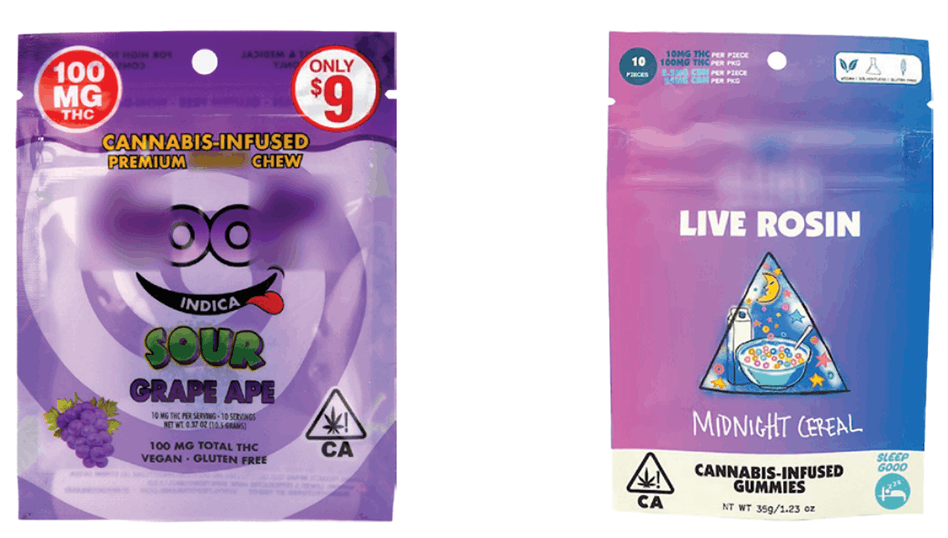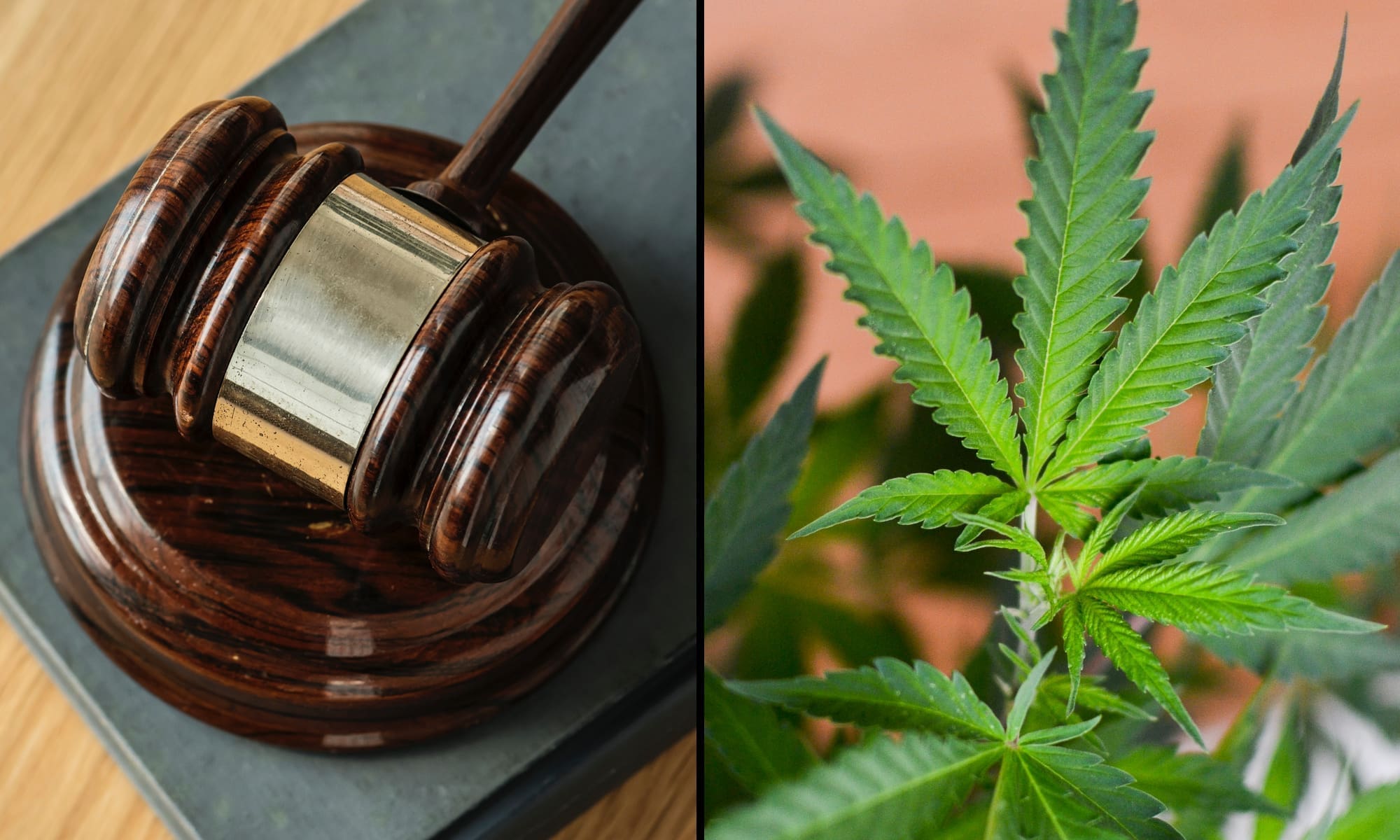featured
California Could Tighten Cannabis Regulations, Up Penalties After State Audit
Published
1 week agoon

A California state auditor’s report released Aug. 7 could spark cannabis regulatory changes related to product packaging, business inspections, penalties, flavors for inhalants, and even strain names, such as Lemon Cherry Gelato.
The 53-page report from California State Auditor Grant Parks’ office outlines key findings, including packaging and strain names that are attractive to children, and a lack of resources within the state’s Department of Cannabis Control (DCC) to properly identify and track repeat offenders.
Parks’ audit of the DCC specifically focused on the department’s youth advertising and marketing enforcement.
“We found that state law and DCC’s regulations about design elements that are attractive to children are unspecific, leading to subjective and sometimes inconsistent determinations of whether cannabis product packaging is compliant,” Parks wrote in an Aug. 7 letter to Gov. Gavin Newsom and legislative leaders in the California Senate and Assembly.
“Additionally, DCC does not adequately discipline the cannabis businesses that it licenses (licensees) who repeatedly violate regulations regarding attractiveness to children,” he wrote. “DCC’s inspectors do not have consistent documentation practices, and we could not conclude that DCC consistently checks a licensee’s compliance history when evaluating whether that licensee is selling a cannabis product with packaging that is attractive to children.”
Parks recommended that state lawmakers clarify design elements that are prohibited from cannabis packaging, and that the DCC improve its documentation while also specifying penalties to disincentivize repeat offenders.
Furthermore, the state auditor found that the DCC’s regulations do not adequately prohibit flavors in cannabis inhalants, and that the department does not regulate the use of strain names on product packaging that suggest flavors are attractive to children. Parks specifically called out strain names like Cherry Pie, Tropicana Punch and Lemon Cherry Gelato, the latter of which was a top-10 bestseller for California operators in 2024. Some cannabis strain names are likely attractive to children, according to the California State Auditor.auditor.ca.gov
Some cannabis strain names are likely attractive to children, according to the California State Auditor.auditor.ca.gov
Parks recommended that lawmakers specify in state law what flavors are prohibited and that the DCC regulate the use of cannabis strain names on product packaging that suggest flavors attractive to children.
In urging legislative and departmental action, the state auditor called attention to a specific public safety trend that ensued after California voters passed Proposition 64 to legalize adult-use cannabis in the November 2016 election.
In the report, Parks points out that there was a 469% increase in the number of calls to the California Poison Control System related to accidental cannabis ingestion for children 5 years and younger—from 148 calls in 2016 to 842 calls in 2023.
In a July 22 response to the state auditor’s draft report, DCC Director Nicole Elliott said the department remains committed to preventing youth exposure to cannabis. However, she said those numbers don’t tell the whole story.
“Exposure of children to cannabis is a serious and growing issue,” Elliott wrote. “These statistics do not differentiate between instances related to legal and regulated cannabis products and instances with unregulated, illegal products such as hemp-derived THC edibles, homemade cannabis edibles, or other illicit products without formal access restrictions.”
Within a year of California launching licensed adult-use cannabis sales in January 2018, the federal government passed the 2018 Farm Bill, expanding the legalization of hemp from pilot programs to full-scale implementation. As a result of vague language in the federal legislation, intoxicating hemp products—notably consumable products—proliferated nationwide, leaving states like California struggling to regulate the marketplace.
Parks said in the audit that edible THC products, in particular, appeal to youth because of their shape, color and taste, as well as colorful branding and advertising of fruity or candy flavors.
In addition to hemp, California cannabis regulators and enforcement officials have largely been unsuccessful in eradicating the illicit market: According to a March 2025 report commissioned by the DCC, California produced roughly 11.4 million pounds of unregulated cannabis compared to 1.4 million pounds of regulated cannabis in 2024.
If the unregulated cannabis has a similar retail value to the licensed cannabis, then that means California produced roughly $42 billion in cannabis last year, with $4.7 billion purchased legally in the state, roughly $7.8 billion purchased illegally in the state, and another roughly $29 billion shipped out of state.
“DCC cautions against overstating regulated cannabis’s impact on the increase in exposure of children,” Elliott wrote. “While regulated cannabis has become more widely available, publicly available data still shows that only less than half of California has access to regulated cannabis products, while the entire state continues to have access to illicit or unregulated cannabis. These other products are almost certainly significant contributors. Addressing this issue requires a full understanding of all the ways children are exposed to cannabis.”
Elliott also pointed out that children are less likely to access cannabis that’s regulated by child-resistant packaging and point-of-sale age verification than unregulated products.
Nonetheless, Parks took issue with the DCC’s practices, claiming that 14 of 40 cannabis products his office reviewed had images of food or candy on the packaging. This product review included 24 edibles, six beverages, four concentrates, three tinctures, one flower, one pre-roll and one topical.
 Despite DCC’s Regulation Prohibiting Cartoons, Packaging on Some Cannabis Products Presented Cartoon Images of Foodauditor.ca.gov
Despite DCC’s Regulation Prohibiting Cartoons, Packaging on Some Cannabis Products Presented Cartoon Images of Foodauditor.ca.gov
Parks pointed out that Oregon “uses a best practice” by requiring its cannabis commission to review packaging before a cannabis product goes to market, and that Oregon also limits certain strain names. He suggested that the California Legislature consider adopting a similar process, including prohibiting bubble and cartoon-like fonts and bright or neon colors on packaging.
The California auditor also outlined what it called subjected determinations by the department.
“For example, DCC reviewed three similar cannabis crispy rice treat packages and found that only one was attractive to children,” according to the report. “We believe that images of foods like marshmallows, cereals, fruits, and chocolate chips are attractive to children.”
 Images of food or candy children might like, including images of the product itself, according to the California State Auditor.auditor.ca.gov
Images of food or candy children might like, including images of the product itself, according to the California State Auditor.auditor.ca.gov
Parks also determined that the DCC has taken “minimal action” against licensees who use packaging that the auditor’s office believes is attractive to children, and that the department does not adequately track repeat offenders.
“DCC reports that it only has the resources to inspect about half of the state’s licensees per year but would ideally inspect every licensee annually,” according to the report. “DCC neither adequately tracks nor escalates penalties for repeat violators. For example, one licensee violated regulations that prohibit packaging that is attractive to children four times, yet DCC did not increase penalties.”
Regarding resources, the DCC has conducted roughly 3,875 inspections annually since 2022, yet the state has roughly 8,900 licensees, according to the report.
While the DCC indicated that it would work with state lawmakers on any legislation resulting from the auditor’s report, department officials disagreed with Parks’ conclusion that they need to modify their disciplinary actions for repeat offenders, according to the report. Elliott said the DCC follows a structured approach to discipline.
However, DCC staff did share ideas with Parks’ office about possibly implementing packaging regulations to prohibit:
- Images of anthropomorphized fruit, candy, and confections
- All characters, human or otherwise
- Images of animals and humans
- Holographic packaging or stickers
“Addressing ‘attractiveness to children’ can be a complicated issue,” Elliott wrote. “The challenge DCC must overcome in its effort to rein in harmful packaging elements is what is ‘attractive to children’ can be inherently subjective, culturally influenced, and dynamic over time. This effort will always be a work in progress as cultural trends and tastes change. DCC’s current regulations aim to give the department flexibility to modify its determinations as branding and packaging evolve with current trends and associations. The department welcomes input on how best to strengthen this effort.”

Author: mscannabiz.com
MScannaBIZ for all you Mississippi Cannabis News and Information.
You may like
-


Massachusetts Auditor Notes ‘Violations’ and ‘Mismanagement’ At Cannabis Control Commission
-


Supreme Court Gives Marijuana Companies More Time To File Petition In Case Challenging Federal Prohibition
-


Canopy USA Appoints New Executive Team to Accelerate Growth
-


Washington Adult-Use Cannabis Sales Decline for Fifth Straight Year
-


Delaware Governor Seeks Marijuana Regulation Advice From Colorado Counterpart As State’s Legal Market Launches
-


Major trucking group’s cannabis rescheduling concerns (Newsletter: August 18, 2025)
featured
Massachusetts Auditor Notes ‘Violations’ and ‘Mismanagement’ At Cannabis Control Commission
Published
14 minutes agoon
August 18, 2025
Massachusetts Auditor Diana DiZoglio last week released an audit of the state’s Cannabis Control Commission (CCC), claiming to have uncovered violations and mismanagement issues at the commission, NBC Boston reports.
The audit found that officials “failed to take appropriate steps and institute procedures” to guarantee the administering of cannabis industry license extensions, and that a “lack of supervision and minimal accountability over licensing staff members” helped contribute to the breakdown.
“CCC’s mismanagement of prorated fees for license extensions resulted in procedural inequity, revenue loss, and noncompliance with state regulations.” — Excerpt from the audit summary
The commission said it has “been working closely with the State Auditor’s Office for almost a year and will review the report released today in furtherance of our shared commitment to government improvement. Over the course of the audit period and since, the Commission has hired key leaders, made progress to address many of the issues referenced, and begun to move forward in a constructive way.”
The report was released hours after the commission voted unanimously to reinstate the license of Assured Testing, a testing lab accused of failing to report thousands of contaminated cannabis samples, the report said. The commission issued penalties against the lab, including a $300,000 fine and two years of probation. Additionally, the lab — which has publicly disagreed with the findings but says it will honor the commission’s terms for reinstatement — will have to hire an independent auditor, an internal control manager, and a new interim CEO.
“We are eager to return to what we do best: delivering scientific, evidence-backed testing with industry-leading cannabis expertise,” Assured Testing said in a statement.

Author: mscannabiz.com
MScannaBIZ for all you Mississippi Cannabis News and Information.
featured
Supreme Court Gives Marijuana Companies More Time To File Petition In Case Challenging Federal Prohibition
Published
1 hour agoon
August 18, 2025
The U.S. Supreme Court has granted a request to give marijuana companies suing the Justice Department in an effort to overturn federal prohibition two more months to file their petition with the justices.
Lawyers for the cannabis firms said the extension was needed due to the “significant and complex constitutional issues” that are being raised in the case, as well as the fact that state governments and other experts who plan to file support briefs need more time to “carefully craft their arguments.”
The prominent litigation firm Boies Schiller Flexner LLP that’s representing the companies—Canna Provisions, Gyasi Sellers, Wiseacre Farm and Verano Holdings—entered a request for a 60-day extension to submit its writ of certiorari last week. Justice Ketanji Brown Jackson approved the proposal on Friday, pushing back the current deadline of August 25 to October 24.
The companies’ request noted that counsel for the Office of the Solicitor General don’t oppose the extension.
The brief gave three reasons for the request: 1) the lead attorney on the case, David Boies, is “heavily engaged in previously scheduled matters” before other federal courts, 2) several experts who expressed interest in supporting their lawsuit with amicus briefs have said they need more time and 3) the case involves complex legal issues that require more in-depth consideration.
“This case presents significant and complex constitutional issues concerning both state-regulated marijuana specifically and the authority of Congress to regulate purely intrastate commerce generally,” the filing says. “The additional time will permit counsel to prepare a petition that appropriately addresses the questions of nationwide importance raised by this case.”
That includes “the question of whether [Gonzales v. Raich] was correctly decided,” it says, referencing a landmark 2005 Supreme Court ruling, wherein justices narrowly determined that the federal government could enforce prohibition against cannabis cultivation that took place wholly within California based on Congress’s authority to regulate interstate commerce.
With respect to future amicus briefs the applicants are expecting, they said “counsel have heard from law professors, non-profits, state governments, and others interested in submitting amicus briefs in these proceedings, and several of these potential amici have expressed concern about having sufficient time to prepare over the summer.”
“An extension will provide potential amici adequate time to consider the case and carefully craft their arguments,” the filing says.
This comes about three months after a U.S. appeals court rejected the arguments of the state-legal cannabis companies, one the latest blow to the high-profile lawsuit following a lower court’s dismissal of the claims. But it’s widely understood that the plaintiffs’ legal team has long intended the matter to end up before the nine justices.
“It’s fair to assume that we shall seek Supreme Court review,” attorney Jonathan Schiller told Marijuana Moment in June.
The latest filing concludes by saying respondents “will not suffer any prejudice from the requested extension,” and because “the First Circuit affirmed the dismissal of Applicants’ claims, a brief extension will not in any way alter the status quo of this case.”
While it remains to be seen whether the high court will ultimately take the case, one sign that at least some on court might be interested in the appeal is a 2021 statement from Justice Clarence Thomas, issued as the court denied review of a separate dispute involving a Colorado medical marijuana dispensary.
Thomas’s comments seemed to suggest that it’d be appropriate revisit Raich—a move that could largely upend federal prohibition.
The statement pointed to policy developments since the earlier case was decided, such as the hands-off enforcement approach taken by the Department of Justice as more states legalized cannabis and a congressional budget rider protecting state-legal medical marijuana programs.
“Whatever the merits of Raich when it was decided, federal policies of the past 16 years have greatly undermined its reasoning,” Thomas wrote, describing the government’s approach to cannabis enforcement as “a half-in, half-out regime that simultaneously tolerates and forbids local use of marijuana.”
“Though federal law still flatly forbids the intrastate possession, cultivation, or distribution of marijuana…the Government, post-Raich, has sent mixed signals on its views,” the justice continued, saying the situation “strains basic principles of federalism and conceals traps for the unwary.”
Once plaintiffs in the case at hand file their forthcoming petition for a writ of certiorari, it would need needs the votes of four justices to put the case before the Supreme Court.
The initial complaint, filed in U.S. District Court for the District of Massachusetts, argued that government’s ongoing prohibition on marijuana under the Controlled Substances Act (CSA) was unconstitutional because Congress in recent decades had “dropped any assumption that federal control of state-regulated marijuana is necessary.”
At oral argument on appeal late last year, Boies told judges that under the Constitution, Congress can only regulate commercial activity within a state—in this case, around marijuana—if the failure to regulate that in-state activity “would substantially interfere [with] or undermine legitimate congressional regulation of interstate commerce.”
Judges, however, said they were “unpersuaded,” ruling in last month’s opinion that “the CSA remains fully intact as to the regulation of the commercial activity involving marijuana for non-medical purposes, which is the activity in which the appellants, by their own account, are engaged.”
The district court, meanwhile, said in the case that while the there are “persuasive reasons for a reexamination” of the current scheduling of cannabis, its hands were effectively tied by past U.S. Supreme Court precedent in Raich.
Meanwhile, amid a series of legal challenges, the Trump administration recently asked the Supreme Court to take up a case on the federal government’s ban on users of marijuana and other illegal drugs from owning firearms and uphold the prohibition, saying it is consistent with the Second Amendment.
Separately at the federal level, a pending Biden-era recommendation to reschedule marijuana to the less restrictive Schedule III of the CSA is remains stalled.
The MAGA world is divided on how it wants President Donald Trump to come down on that proposal, with key right-wing influencers voicing conflicting positions on the issue after the president announced an imminent decision last week.
While Trump endorsed moving marijuana to Schedule III during last year’s presidential campaign—along with cannabis industry banking access and a Florida legalization ballot initiative that ultimately fell short—last week he merely said he is considering the issue, with a decision expected within weeks.
The overall bipartisanship of the issue, however, was also reflected in recent comments from one Democratic and one Republican member of Congress, who urged Trump to federally reschedule marijuana.
A new political committee that shares the same treasurer as Trump’s own super PAC is also pushing the president to follow through on rescheduling marijuana, releasing an ad that highlights his previous endorsement of the reform on the campaign trail.
Photo elements courtesy of rawpixel and Philip Steffan.

Author: mscannabiz.com
MScannaBIZ for all you Mississippi Cannabis News and Information.
featured
Canopy USA Appoints New Executive Team to Accelerate Growth
Published
2 hours agoon
August 18, 2025
[PRESS RELEASE] – BOULDER, Colo., Aug. 18, 2025 – Canopy USA LLC, a brand-driven organization strategically positioned across the fastest-growing states and highest potential segments of the U.S. cannabis market, announced the appointment of a new executive team responsible for driving the company’s next phase of expansion.
Drawing on extensive industry experience, these leaders will steer Canopy USA forward through a shared vision to elevate the company’s brand portfolio, enhance day-to-day operations and execution, and advance growth initiatives across multiple state markets.
- Casey Rash, chief financial officer, will oversee centralized functions including finance, human resources and IT. Rash brings deep expertise in regulated industries and a strategic approach to driving organizational scale and efficiency.
- Rebecca Kirk, chief operating officer, will lead the company’s operations, innovation and legal teams. Known for building scalable systems and launching category-leading products, Kirk will play a critical role in driving Canopy USA’s performance across its value chain.
- Kelly Flores, chief business development officer, will be responsible for marketing, market expansion and product strategy. With a proven track record in cannabis commercialization, Flores will guide brand development and strategic growth initiatives in both existing and emerging state markets.
“These leadership appointments mark the start of a plan to capture growth in the U.S. cannabis market,” Canopy USA President Brooks Jorgensen said. “Within the best of each Acreage, Jetty and Wana, we’ve been aligning systems, teams and processes across markets to create a scalable, efficient organization. With our leadership team now in place, we’re moving forward with purpose.”
Canopy USA’s platform is built to deliver consistent quality, innovative products and trusted brands to consumers and retail partners nationwide. By combining deep market expertise with a focus on execution, the company aims to set the standard for growth and leadership in the evolving U.S. cannabis industry.

Author: mscannabiz.com
MScannaBIZ for all you Mississippi Cannabis News and Information.

Massachusetts Auditor Notes ‘Violations’ and ‘Mismanagement’ At Cannabis Control Commission

Supreme Court Gives Marijuana Companies More Time To File Petition In Case Challenging Federal Prohibition

Canopy USA Appoints New Executive Team to Accelerate Growth

Washington Adult-Use Cannabis Sales Decline for Fifth Straight Year

Delaware Governor Seeks Marijuana Regulation Advice From Colorado Counterpart As State’s Legal Market Launches

Major trucking group’s cannabis rescheduling concerns (Newsletter: August 18, 2025)

From The Vault: The HIGH TIMES interview Allen Ginsberg (1992)

Court throws out part of New York’s marijuana licensing rules

Watch Immigration Enforcement Rattles the Cannabis Industry | SoCal Matters Season 2025

Two arrested as police close four unlicensed cannabis shops in Seneca Falls

High-potency cannabis use linked to psychosis | Watch News Videos Online

High Times Strains Of The Month: August 2025

Texas Crime Labs Say They Don’t Have Enough Resources To Test Hemp Products For THC As Lawmakers Consider Ban

Trump on changes to marijuana policy: 'We're looking at it'

Realtors’ Stolen Credit Cards Are Used to Build an Illegal Marijuana Farm

Grady County Sheriff's Office makes arrests in illegal marijuana bust

High Times Was The Most Influential Publication Of My Life

Revelry NYC 2025: Inside New York’s Cannabis Culture & Industry Festival

Revelry NYC 2025: Inside New York’s Cannabis Culture & Industry Festival

Indian Tribes See Opportunity In Hemp THC Products, Even In States That Continue Marijuana Criminalization

Two Oakland cannabis dispensaries targeted again by ram-raiding burglars

Trump on changes to marijuana policy: 'We're looking at it'

Bill Maher Takes Credit for Possibility Trump Might Reshedule Marijuana

Social cannabis use rules will be published Friday

Alert: Department of Cannabis Control updates data dashboards with full data for 2023

Connecticut Appoints The US’s First Cannabis Ombudsperson – Yes there is a pun in there and I’m Sure Erin Kirk Is Going To Hear It More Than Once!

5 best CBD creams of 2024 by Leafly

EU initiative begins bid to open access to psychedelic therapies
New Study Analyzes the Effects of THCV, CBD on Weight Loss

Free delta-9 gummies from Bay Smokes

5 best autoflower seed banks of 2024 by Leafly

Discover New York’s dankest cannabis brands [September 2024]

Curaleaf Start Process Of Getting Their Claws Into The UK’s National Health System – With Former MP (Resigned Today 30/5/24) As The Front Man

May 2024 Leafly HighLight: Pink Runtz strain

Mississippi city official pleads guilty to selling fake CBD products

Press Release: CANNRA Calls for Farm Bill to Clarify Existing State Authority to Regulate Hemp Products

Local medical cannabis dispensary reacts to MSDH pulling Rapid Analytics License – WLBT

Horn Lake denies cannabis dispensary request to allow sale of drug paraphernalia and Sunday sales | News

5 best THC drinks of 2024 by Leafly

Nevada CCB to Accept Applications for Cannabis Establishments in White Pine County – “Only one cultivation and one production license will be awarded in White Pine County”

6 best CBD gummies of 2024 by Leafly

The Daily Hit: October 2, 2024

5 best delta-9 THC gummies of 2024 by Leafly

Weekly Update: Monday, May 13, 2024 including, New Guide for Renewals & May Board meeting application deadline

PRESS RELEASE : Justice Department Submits Proposed Regulation to Reschedule Marijuana

People In This State Googled ‘Medical Marijuana’ The Most, Study Shows

Thailand: Pro-cannabis advocates rally ahead of the government’s plan to recriminalize the plant

5 best THCA flower of 2024 by Leafly
Trending
-

 California Cannabis Updates1 year ago
California Cannabis Updates1 year agoAlert: Department of Cannabis Control updates data dashboards with full data for 2023
-

 Breaking News1 year ago
Breaking News1 year agoConnecticut Appoints The US’s First Cannabis Ombudsperson – Yes there is a pun in there and I’m Sure Erin Kirk Is Going To Hear It More Than Once!
-

 best list1 year ago
best list1 year ago5 best CBD creams of 2024 by Leafly
-

 Business11 months ago
Business11 months agoEU initiative begins bid to open access to psychedelic therapies
-

 cbd1 year ago
cbd1 year agoNew Study Analyzes the Effects of THCV, CBD on Weight Loss
-

 Bay Smokes1 year ago
Bay Smokes1 year agoFree delta-9 gummies from Bay Smokes
-

 autoflower seeds11 months ago
autoflower seeds11 months ago5 best autoflower seed banks of 2024 by Leafly
-

 cannabis brands11 months ago
cannabis brands11 months agoDiscover New York’s dankest cannabis brands [September 2024]




